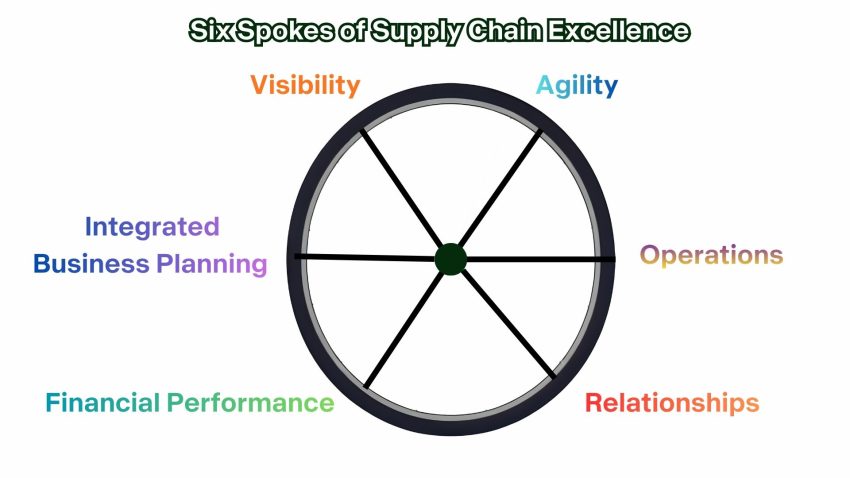Just as Darius Foroux’s Six Spokes Theory emphasizes the importance of balancing body, mind, work, love, money, and play for an optimal life. I believe that the supply chain management requires a similar holistic approach. A truly resilient and efficient supply chain operates like a well-balanced wheel, with six critical spokes working in harmony to drive business success. When any spoke weakens or fails, the entire system becomes unstable, leading to disruptions that can cascade throughout the network.

Let’s explore how applying this framework can transform your approach to supply chain management.
Spoke 1: Visibility (The Mind)
Visibility serves as the mind of your supply chain because the intelligence that drives informed decision-making. Just as mental clarity enables better life choices, supply chain visibility provides the transparency needed to anticipate challenges, identify opportunities, and respond swiftly to disruptions.
This spoke encompasses real-time tracking, data analytics, demand forecasting, and end-to-end transparency across all tiers of suppliers and partners. Modern supply chains leverage IoT sensors, blockchain technology, and AI-powered analytics to create a comprehensive view of inventory levels, shipment status, quality metrics, and potential risks.
Without strong visibility, supply chains operate blindly, reactive rather than proactive, often discovering problems only after they’ve caused significant damage to operations and customer satisfaction.

Spoke 2: Agility (The Body)
Agility represents the physical capability of your supply chain. Its ability to adapt, flex, and respond to changing conditions. Like maintaining physical fitness enables us to handle life’s challenges, supply chain agility ensures your network can quickly pivot when faced with disruptions, demand fluctuations, or market changes.
This includes flexible manufacturing processes, diversified supplier bases, scalable logistics networks, and cross-trained personnel who can adapt to different roles as needed. Agile supply chains maintain buffer inventories strategically, develop multiple sourcing options, and implement modular designs that allow for rapid reconfiguration.
The COVID-19 pandemic highlighted the critical importance of this spoke, as companies with rigid, overly optimized systems struggled while agile organizations quickly adapted to new realities.
Spoke 3: Operations (The Work)
Operations form the work ethic of your supply chain to the disciplined execution of processes that deliver value to customers. This spoke encompasses the day-to-day activities that transform raw materials into finished products and deliver them to end consumers.
Key elements include manufacturing excellence, quality management, inventory optimization, order fulfillment, and continuous improvement initiatives. This is where lean principles, Six Sigma methodologies, and operational excellence frameworks come into play.
Strong operational execution requires standardized processes, skilled workforce development, equipment maintenance, and a culture of accountability. Without solid operations, even the best strategies and technologies will fail to deliver consistent results.
Spoke 4: Relationships (The Love)
Relationships represent the emotional intelligence of your supply chain where the partnerships and collaborations that create mutual value and shared success. Just as love and relationships enrich our personal lives, strong supplier relationships, customer partnerships, and internal collaboration drive supply chain excellence.
This spoke involves supplier development programs, strategic partnerships, collaborative planning processes, and cross-functional teamwork. It’s about moving beyond transactional relationships to create long-term partnerships built on trust, transparency and shared objectives.
Companies with strong relationship spokes invest in supplier capability development, share forecasts and strategic plans, and work together to solve challenges and capture opportunities. They understand that their success is intertwined with their partners’ success.
Spoke 5: Financial Performance (The Money)
Financial performance serves as the economic engine of your supply chain, ensuring sustainable operations while driving shareholder value. Like managing personal finances, supply chain financial management requires balancing competing priorities while optimizing total cost of ownership.
This encompasses cost management, working capital optimization, investment decisions, risk assessment, and value creation initiatives. It involves sophisticated modeling to understand trade-offs between service levels and costs, inventory investments and cash flow, and automation investments versus labor costs.
Smart financial management in supply chains goes beyond simply cutting costs. It’s about optimizing value creation while maintaining service excellence and building capabilities for future growth.

Spoke 6: Integrated Business Planning (The Play)
Integrated Business Planning (IBP) represents the orchestration and alignment of your company beyond the supply chain. It is a collaborative process that harmonizes strategy with execution across all business functions. Like play brings balance and joy to life through purposeful engagement, IBP brings coherence to supply chains by aligning demand, supply, product, and financial plans.
This encompasses Sales & Operations Planning (S&OP), demand and supply balancing, scenario planning, portfolio management, and strategic alignment processes. IBP creates a single source of truth where finance, sales, operations, and supply chain collaborate to make informed trade-off decisions.
Mature IBP processes move beyond monthly meetings to become a continuous planning cycle that connects long-term strategic objectives with short-term operational decisions. They incorporate what-if analysis, risk assessment, and cross-functional consensus-building to ensure the entire organization moves in sync toward common goals.
Achieving Balance: The Path to Excellence
The power of the Six Spokes framework lies not in perfecting individual elements, but in achieving dynamic balance among all six. A supply chain that excels in operations but lacks visibility will struggle with disruptions. One with strong relationships but poor financial performance won’t survive long-term.
Excellence comes from recognizing that these spokes are interconnected—visibility enables agility, relationships facilitate innovation, financial performance funds operational excellence, and so forth. The strongest supply chains regularly assess their spoke balance, identifying areas that need attention while maintaining strength in others.
By adopting this holistic perspective, supply chain leaders can build networks that don’t just survive disruptions but thrive in an increasingly complex and uncertain world. The Six Spokes of Supply Chain Excellence provides a framework for balanced growth, sustainable performance, and long-term competitive advantage.
Remember: a wheel with one broken spoke cannot roll smoothly. Your supply chain’s success depends on strengthening all six spokes simultaneously.

1 thought on “The Six Spokes of Supply Chain Excellence: Building a Balanced and Resilient Network”